A contras between Greek mythology and bible stories
中国神仙vs外国神仙英语作文
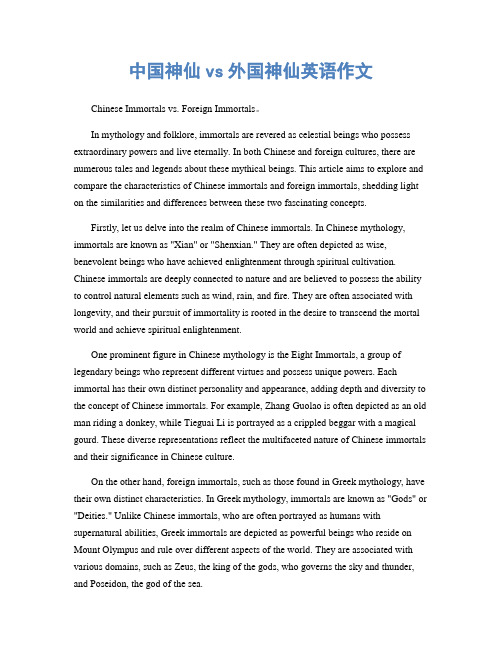
中国神仙vs外国神仙英语作文Chinese Immortals vs. Foreign Immortals。
In mythology and folklore, immortals are revered as celestial beings who possess extraordinary powers and live eternally. In both Chinese and foreign cultures, there are numerous tales and legends about these mythical beings. This article aims to explore and compare the characteristics of Chinese immortals and foreign immortals, shedding light on the similarities and differences between these two fascinating concepts.Firstly, let us delve into the realm of Chinese immortals. In Chinese mythology, immortals are known as "Xian" or "Shenxian." They are often depicted as wise, benevolent beings who have achieved enlightenment through spiritual cultivation. Chinese immortals are deeply connected to nature and are believed to possess the ability to control natural elements such as wind, rain, and fire. They are often associated with longevity, and their pursuit of immortality is rooted in the desire to transcend the mortal world and achieve spiritual enlightenment.One prominent figure in Chinese mythology is the Eight Immortals, a group of legendary beings who represent different virtues and possess unique powers. Each immortal has their own distinct personality and appearance, adding depth and diversity to the concept of Chinese immortals. For example, Zhang Guolao is often depicted as an old man riding a donkey, while Tieguai Li is portrayed as a crippled beggar with a magical gourd. These diverse representations reflect the multifaceted nature of Chinese immortals and their significance in Chinese culture.On the other hand, foreign immortals, such as those found in Greek mythology, have their own distinct characteristics. In Greek mythology, immortals are known as "Gods" or "Deities." Unlike Chinese immortals, who are often portrayed as humans with supernatural abilities, Greek immortals are depicted as powerful beings who reside on Mount Olympus and rule over different aspects of the world. They are associated with various domains, such as Zeus, the king of the gods, who governs the sky and thunder, and Poseidon, the god of the sea.Foreign immortals, particularly in Greek mythology, are often portrayed as flawed beings with human-like emotions and desires. They engage in conflicts and rivalries, resulting in epic tales of heroism and tragedy. This contrast with the more serene and harmonious nature of Chinese immortals reflects the cultural differences between the two concepts.Despite these differences, Chinese and foreign immortals share a common thread –the pursuit of immortality. Both cultures have stories and legends that revolve around individuals seeking eternal life or transcending the boundaries of mortality. This shared theme underscores the universal human desire for immortality and the quest for spiritual enlightenment.In conclusion, the concept of immortality is a fascinating aspect of mythology and folklore in both Chinese and foreign cultures. Chinese immortals, with their connection to nature and pursuit of spiritual enlightenment, offer a unique perspective on the concept. In contrast, foreign immortals, such as those found in Greek mythology, embody power and human-like emotions. While there are differences in their characteristics and representations, the pursuit of immortality remains a common theme. These mythical beings continue to captivate our imagination and provide insights into the human longing for transcendence and eternal life.。
Greek Mythology古希腊神话英文介绍PPT
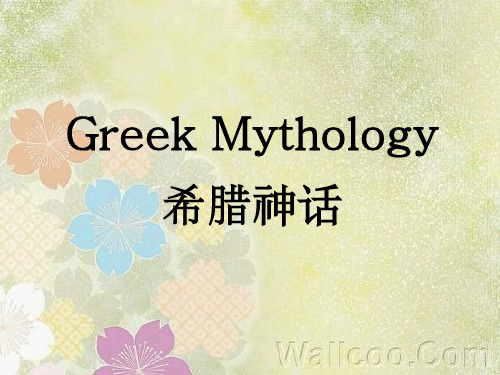
Of all the Olympians, she is the mildest, most upright and most charitable (仁慈的).
Ares 阿瑞斯
Son of Zeus and Hera.
God of war.
He is considered murderous (行凶的) and bloodstained (血污的)but also a coward. He was disliked by both parents.
克罗诺斯在他母亲的建议和帮助下打败了他的父亲乌拉诺斯, 分开了天地间的连接,成为了宇宙的新首领。克罗诺斯与他的姐姐 瑞亚结婚,诞生了宙斯以及他的兄弟姐妹,翻开了古奥林匹亚崭新 的一页。
Gods
the old theogony : the Tians (旧神谱:奥林匹斯十二泰坦) the old theogony : the Gods (新神谱奥林匹斯十二主神) Perseus (珀尔修斯) Jason (伊阿宋) Heracles (赫拉克勒斯) Theseus (忒修斯) Medusa(美杜莎) Minotaurus (米诺陶洛斯) Cerberus (刻耳柏洛斯)
Cronus(克罗诺斯) : 天空之神。 Rhea(瑞亚) : 时光女神。 Oceanus(俄刻阿诺斯) : 水之神。 Tethys(泰西斯) : 沧海女神。俄刻阿诺斯之妻。 Crius(克瑞斯) : 生长之神。 Lapetus (伊阿佩托斯) : 灵魂之神 。阿忒拉斯、普罗米修斯、厄庇米 修斯和墨诺提俄斯之父。 Phoebe(福柏) : 月之女神。月之女神勒托与阿斯特瑞亚之母。 Coeus (科俄斯) : 智力之神。 Themis (忒弥斯) : 秩序和正义女神。宙斯第二位妻子,时序三女神母 。 Mnemosyne(谟涅摩叙涅) : 记忆之神。宙斯第五位妻子,九缪斯之母 。 Hyperion(许配利翁) : 光之神 Thea(忒亚) : 许配利翁之妻。
中国神话与希腊神话的对比英语作文

中国神话与希腊神话的对比英语作文Chinese mythology and Greek mythology are both rich and diverse, offering a glimpse into the cultural and religious beliefs of each respective civilization. While there are some similarities between the two, there are also stark differences that set them apart.One of the most striking differences between Chinese and Greek mythology is the pantheon of gods. In Greek mythology, there are a multitude of gods and goddesses, each with their own distinct personalities, powers, and domains. Theyinteract with each other and with mortals, often creating drama and conflict that drives the stories forward. In contrast, Chinese mythology is centered around a smaller number of gods and supernatural beings, with a strong emphasis on the concept of yin and yang, as well as the balance of nature.Another key difference is the portrayal of the afterlife. In Greek mythology, the afterlife is divided into different realms, such as the Elysian Fields for the virtuous and the Underworld for the damned. There are also various deities and judges who oversee the afterlife and mete out punishment or reward. In Chinese mythology, the afterlife is more closely tied to ancestor worship and the idea of reincarnation. There is a focus on honoring and appeasing deceased family members, as well as achieving spiritual enlightenment through multiple lifetimes.Additionally, the themes and motifs present in the two mythologies differ significantly. Greek mythology often explores themes of heroism, destiny, and the struggle between mortals and immortals. There is a strong emphasis on the concept of tragedy and the flawed nature of humanity. Chinese mythology, on the other hand, frequently delves into themes of harmony, balance, and the cyclical nature of life. Theemphasis is on living in accordance with the natural order and achieving equilibrium within oneself.Despite these differences, there are also some intriguing similarities between Chinese and Greek mythology. Both mythologies feature epic tales of creation, with gods and other supernatural beings forming the world and all its inhabitants. Furthermore, both mythologies contain stories of legendary heroes and their extraordinary adventures, often involving encounters with mythological creatures and deities. The idea of a supernatural realm inhabited by powerful beings is a common thread that runs through both mythologies, as is the concept of divine intervention in the affairs of mortals.In conclusion, Chinese and Greek mythology offer unique insights into the belief systems and cultural values of their respective societies. While there are noticeable differences in terms of gods, afterlife, and themes, there are also intriguing similarities that reflect the common human desireto understand the mysteries of the universe and our place within it. Both mythologies continue to captivate and inspire people around the world, serving as timeless windows into the ancient past.。
介绍西方神话和中国神话的差异英语作文
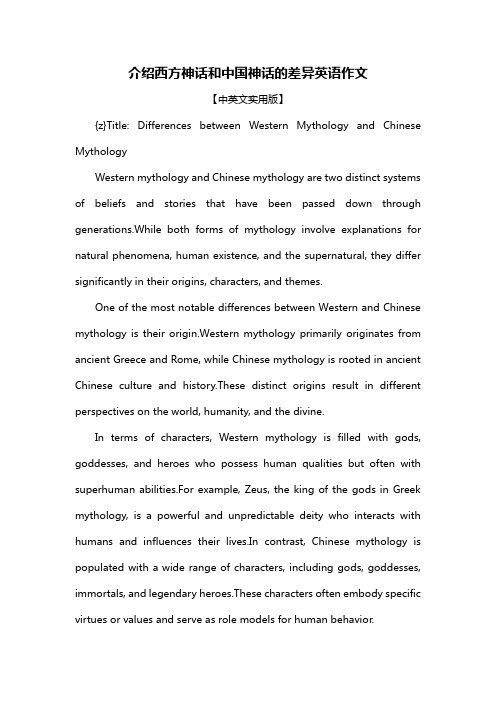
介绍西方神话和中国神话的差异英语作文【中英文实用版】{z}Title: Differences between Western Mythology and Chinese MythologyWestern mythology and Chinese mythology are two distinct systems of beliefs and stories that have been passed down through generations.While both forms of mythology involve explanations for natural phenomena, human existence, and the supernatural, they differ significantly in their origins, characters, and themes.One of the most notable differences between Western and Chinese mythology is their origin.Western mythology primarily originates from ancient Greece and Rome, while Chinese mythology is rooted in ancient Chinese culture and history.These distinct origins result in different perspectives on the world, humanity, and the divine.In terms of characters, Western mythology is filled with gods, goddesses, and heroes who possess human qualities but often with superhuman abilities.For example, Zeus, the king of the gods in Greek mythology, is a powerful and unpredictable deity who interacts with humans and influences their lives.In contrast, Chinese mythology is populated with a wide range of characters, including gods, goddesses, immortals, and legendary heroes.These characters often embody specific virtues or values and serve as role models for human behavior.The themes and messages of Western and Chinese mythology also differ.Western mythology often explores themes of fate, destiny, and the human struggle against the gods.Many Greek and Roman myths revolve around conflicts between gods and humans, or among gods themselves.These stories frequently illustrate the arbitrary and sometimes capricious nature of the divine.In contrast, Chinese mythology tends to focus on themes of harmony, balance, and respect for authority.Many Chinese myths emphasize the importance of filial piety, loyalty, and moral conduct.Another significant difference between Western and Chinese mythology is the role of fate and destiny.In Western mythology, fate and destiny play crucial roles in the lives of gods and humans.The gods often interfere in human affairs and shape the course of history according to their will.In contrast, Chinese mythology places a greater emphasis on personal choice and moral conduct.While there may be predetermined destinies or heavenly plans, individuals still have the freedom to make choices that can alter their own lives and the world around them.In conclusion, Western mythology and Chinese mythology are two rich and diverse traditions that offer unique perspectives on the nature of the divine, human existence, and the universe.From their distinct origins to their different characters, themes, and messages, these two forms of mythology continue to captivate and inspire people around theworld.。
古希腊与古中国对比(英文版)
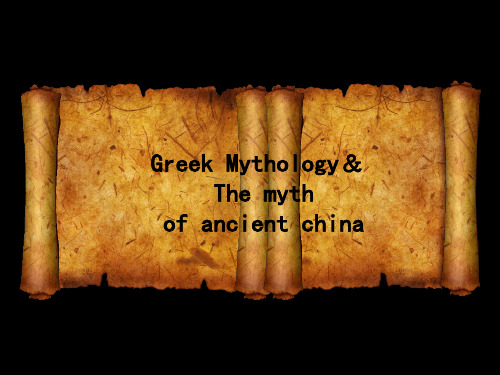
of ancient china
Chinese mythology
Chinese mythology is a collection of cultural history, folk-tales, and religions that have been passed down in oral or written tradition. It includes creation myths and legends, such as myths concerning the founding of Chinese culture and the Chinese state. As in many cultures’ mythologies, Chinese mythology has in the past been believed to be, at least in part, a factual recording of history.
back
An introduction to Nv Wa
• Nv Wa is a goddess in ancient Chinese mythology best known for creating mankind and repairing the wall of heaven by using five-colored stones. giving them life and the ability to bear children. Nv Wa worked unceasingly to repair the damage, melting down the five-colored stones to mend the heavens. She was considered to be the first Chinese ruler and her name is the first on the list of Chinese emperors.
The difference between Chinese and Greek mythology中西方神话的差异

The difference between Chinese and Greek mythologyAs the origins of Oriental and Western civilizations, both of the two ancient civilized countries can trace their mythological roots in an unbroken line for thousands of years.The God of Greek are easy to fall in love with isomerism and lack of ethic. Taking Zeus for an example, he often cajoles the beautiful women. He leaves thousands of romantic debts everywhere, from Olympus to the human life. The Gods from Olympus indulge their selfish desire. Without the conception of ethic, they can fall in love with their good friends even their relatives. In contrast, the Chinese ancient Gods are the one without lust. They follow rules docilely.The God of China are grand and holy. They never envy or do harm to human beings. They are discreet in speech and manner, never cajolery mankind, can't even envy and injure mankind .Nevertheless the god of Greek act arbitraily without principles. In Greek mythology , gods look more human like, outpouring their laical natural emotion, such as love , hate, anger, desire, envy etc. “The Pandora’s box “ is a good example to explain that Zeus uses Pandora to retaliate the human beings. When Pandora opens the door, all the bad things fly away, making the world becomes the gloomy abysm. Even though, he is not satisfied. Then he launchs flood to destroy the world.In all: The most fundamental difference between Chinese and Greek mythologies is that the Chinese gods are made more divine while the Greek gods look more human like.因为起源东方和西方文明,两个古老文明的国家可以追踪他们的神话的根在一个完整的线数千年。
古希腊罗马神话与中国神话的对比
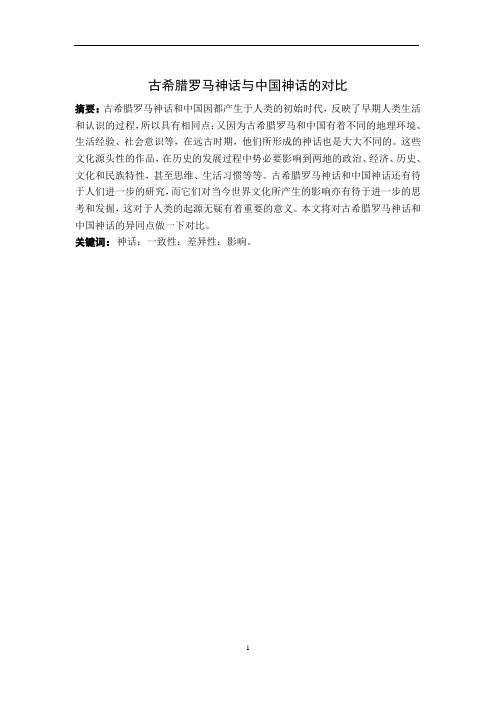
古希腊罗马神话与中国神话的对比摘要:古希腊罗马神话和中国因都产生于人类的初始时代,反映了早期人类生活和认识的过程,所以具有相同点;又因为古希腊罗马和中国有着不同的地理环境、生活经验、社会意识等,在远古时期,他们所形成的神话也是大大不同的。
这些文化源头性的作品,在历史的发展过程中势必要影响到两地的政治、经济、历史、文化和民族特性,甚至思维、生活习惯等等。
古希腊罗马神话和中国神话还有待于人们进一步的研究,而它们对当今世界文化所产生的影响亦有待于进一步的思考和发掘,这对于人类的起源无疑有着重要的意义。
本文将对古希腊罗马神话和中国神话的异同点做一下对比。
关键词:神话;一致性;差异性;影响。
Ancient Greek and Roman mythology and China's mythology contrastAbstract: the ancient Greek and Roman mythology and China have to human being by the initial era, the early human life and cognitive processes, so nothing in common; And because the ancient Greek and Roman and China have different geographical environment, life experience, social consciousness, etc, in ancient times, they formed by the myth is greatly different. These cultural source sex works in the process of historical development in both will inevitably affect the political, economic, history, culture and national character, even thinking and habits etc. Ancient Greek and Roman mythology and China's mythology remains to be people further research, and their world culture on the impact of also needs to be further thinking and excavations for the origin of human beings, which has an important undoubtedly and end-result of meaning. This paper will be of ancient Greek and Roman mythology and Chinese myth of the differences and similarities do a comparison.Keywords:myth; Consistency; The otherness; Influence.引言神话是处在生产力发展水平低下时期远古人类对世界的认识,神话中记录着当时社会的状态。
中西方神话的对比作文
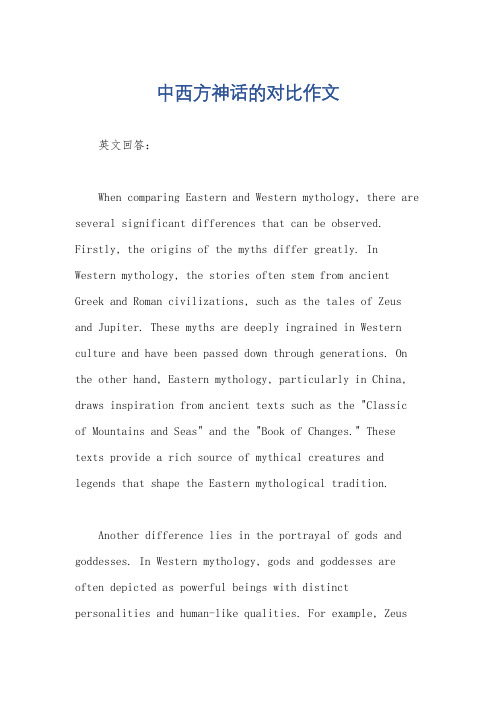
中西方神话的对比作文英文回答:When comparing Eastern and Western mythology, there are several significant differences that can be observed. Firstly, the origins of the myths differ greatly. In Western mythology, the stories often stem from ancient Greek and Roman civilizations, such as the tales of Zeus and Jupiter. These myths are deeply ingrained in Western culture and have been passed down through generations. On the other hand, Eastern mythology, particularly in China, draws inspiration from ancient texts such as the "Classic of Mountains and Seas" and the "Book of Changes." These texts provide a rich source of mythical creatures and legends that shape the Eastern mythological tradition.Another difference lies in the portrayal of gods and goddesses. In Western mythology, gods and goddesses are often depicted as powerful beings with distinct personalities and human-like qualities. For example, Zeusis known for his thunderbolt and his ability to control the weather, while Aphrodite is the goddess of love and beauty. In contrast, Eastern mythology tends to focus more on the concept of deities rather than individual gods and goddesses. The emphasis is on the forces of nature and the balance between yin and yang. These deities are often associated with specific elements or concepts, such as the Dragon King who controls the rain and the Jade Emperor who rules over heaven.Furthermore, the themes and motifs in Eastern and Western mythology differ significantly. Western mythology often explores themes of heroism, fate, and the struggle between good and evil. The stories of Hercules and Perseus, for example, highlight the triumph of the hero against all odds. In contrast, Eastern mythology tends to focus more on themes of harmony, balance, and the interconnectedness of all things. The story of the Monkey King in Chinese mythology, for instance, emphasizes the importance of finding one's place in the world and learning to live in harmony with others.In terms of storytelling style, Western mythology tends to be more linear and focused on individual heroes andtheir quests. The narratives are often filled with epic battles and grand adventures. In contrast, Eastern mythology often employs a more circular and interconnected storytelling style. The stories are often woven together, with characters and events from different mythsintersecting and influencing each other. This creates a sense of continuity and interconnectedness within the mythological world.中文回答:中西方神话在许多方面存在显著的差异。
- 1、下载文档前请自行甄别文档内容的完整性,平台不提供额外的编辑、内容补充、找答案等附加服务。
- 2、"仅部分预览"的文档,不可在线预览部分如存在完整性等问题,可反馈申请退款(可完整预览的文档不适用该条件!)。
- 3、如文档侵犯您的权益,请联系客服反馈,我们会尽快为您处理(人工客服工作时间:9:00-18:30)。
gods in both types of stories are different
• Compare the gods in both types of stories.
In the Bible, the Christian God is omniscient and omnipotent, and opposes Satan, another supernatural figure he cast out of heaven. In Greek myth, there is an entire Pantheon of gods who are related and interact with each other, some more powerful than others.
the origin stories are different
• Compare the origin stories from the Bible
and Greek mythology. In the Bible, God creates the Earth, its features, and its inhabitants over seven days. According to Pantheon, in Greek mythology, the world was created by the titan Chaos, father of the gods.
Was bible influenced by Greek mythology?
• The writers of the Bible may have had divine
inspiration. but a writer can only describe what they know and have seen and heard themselves. When faced with the task of writing the history of the world, there had to be a central basis. what if the basis for the Bible were the ancient myths of the Greek heroes and villains that had been published thousands of years before one page of the Bible had been written?
Similarities between the Bible and Greek mythology
• In both accounts, the female character is said to be the one who
brings the separation of man and God. The Bible states that Eve fell victim to the temptation of Satan through tasting the forbidden fruit from the Tree of Knowledge. She then led Adam to taste the fruit as well, even though God had specifically told them not to. This act forever separates man from God. • In the Greek version, it is Pandora who, out of curiosity, opens the jar where all of the evils of mankind are kept. The jar was to be kept closed…but in the creation of Pandora, Zeus was punishing closed… mankind to begin with. Promethus had given man the secret of fire, Zeus then had his chief craftsman create Pandora as an evil disguised by beauty…dooming her from the beginning…to punish beauty… beginning… Promethus and mankind for being so bold as to depend on themselves inetween Greek mythology and Bible stories
• Both Greek myths and the Bible outline belief systems of
specific cultures. While most people now read Greek myths for pleasure, the Bible is the cornerstone of the Christian religion. Both the Bible and Greek myths deal with how humans interact with higher powers and the history of mankind itself. According to some experts, most Christians believe the stories of the Bible to be historical events, while most people believe Greek myths to be mere stories .
the allegories of the Bible and Greek mythology are different
• Analyze the allegories of the Bible and Greek
mythology. Both stories use allegories, a way of teaching a lesson about the world. By interacting with man in the Bible, God determines the ten commandments that each man should live by. Conversely, in Greek mythology, the gods are often tricksters who take advantage of man's weakness and faults.
The most important difference
• Christianity, in its various divisions, has certain
standards which it regards as authoritative; it has the Bible, which it considers to be directly inspired; it has the Church, or the churches, with their Councils, Assemblies, Confessions and Creeds; and it has a body of trained men whose duty it is to explain and inculcate its doctrines. The Greeks, roundly speaking, had none of these; they had no clergy, no church, and no Bible.
